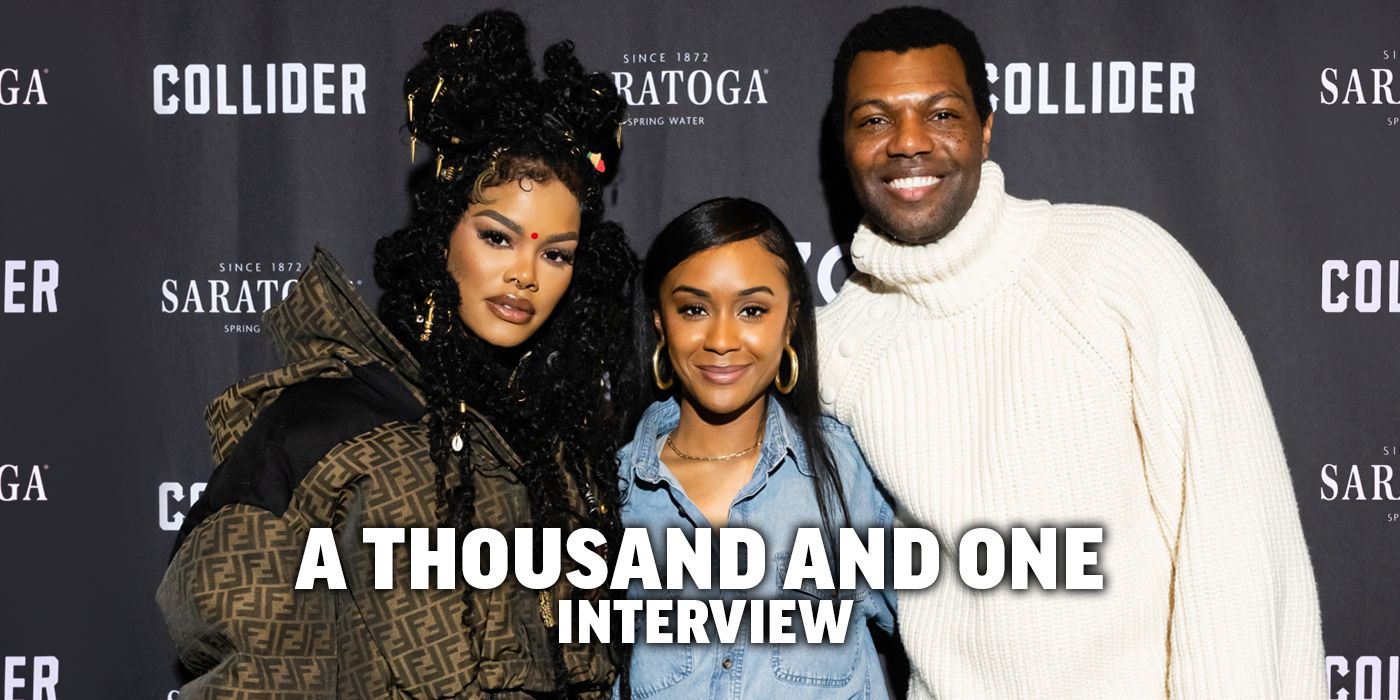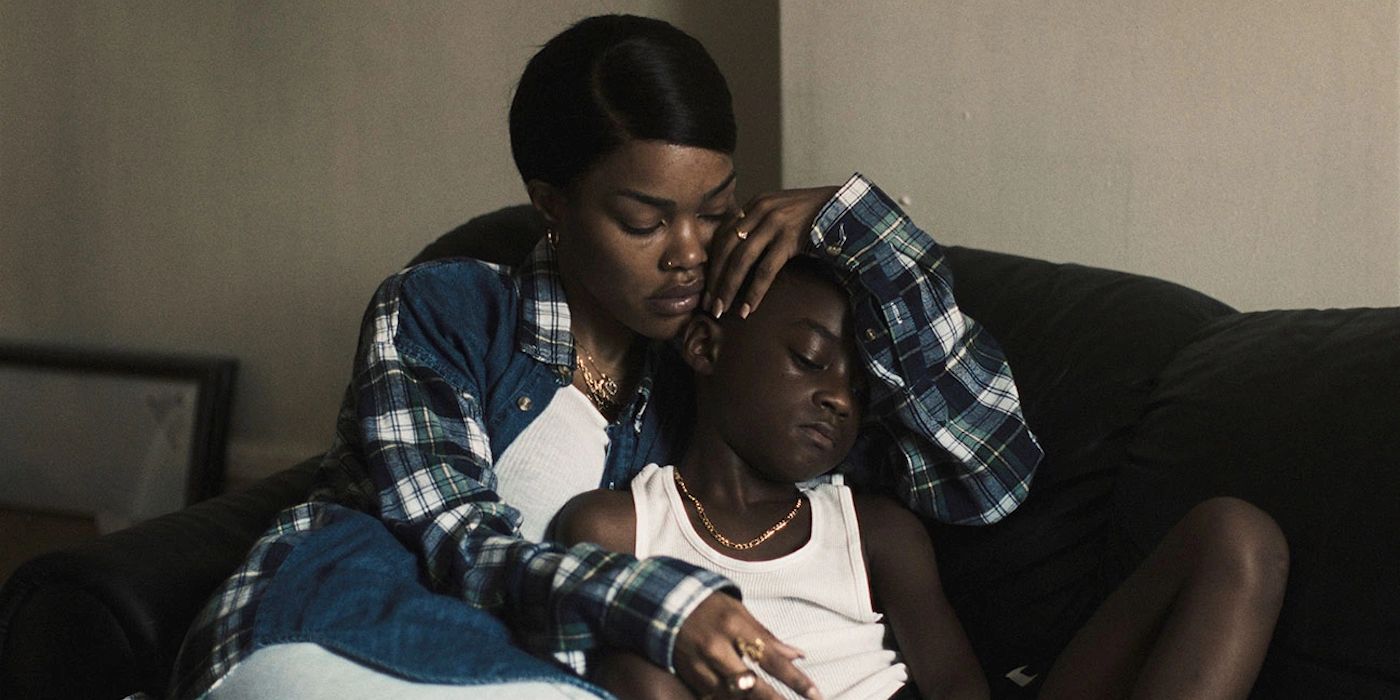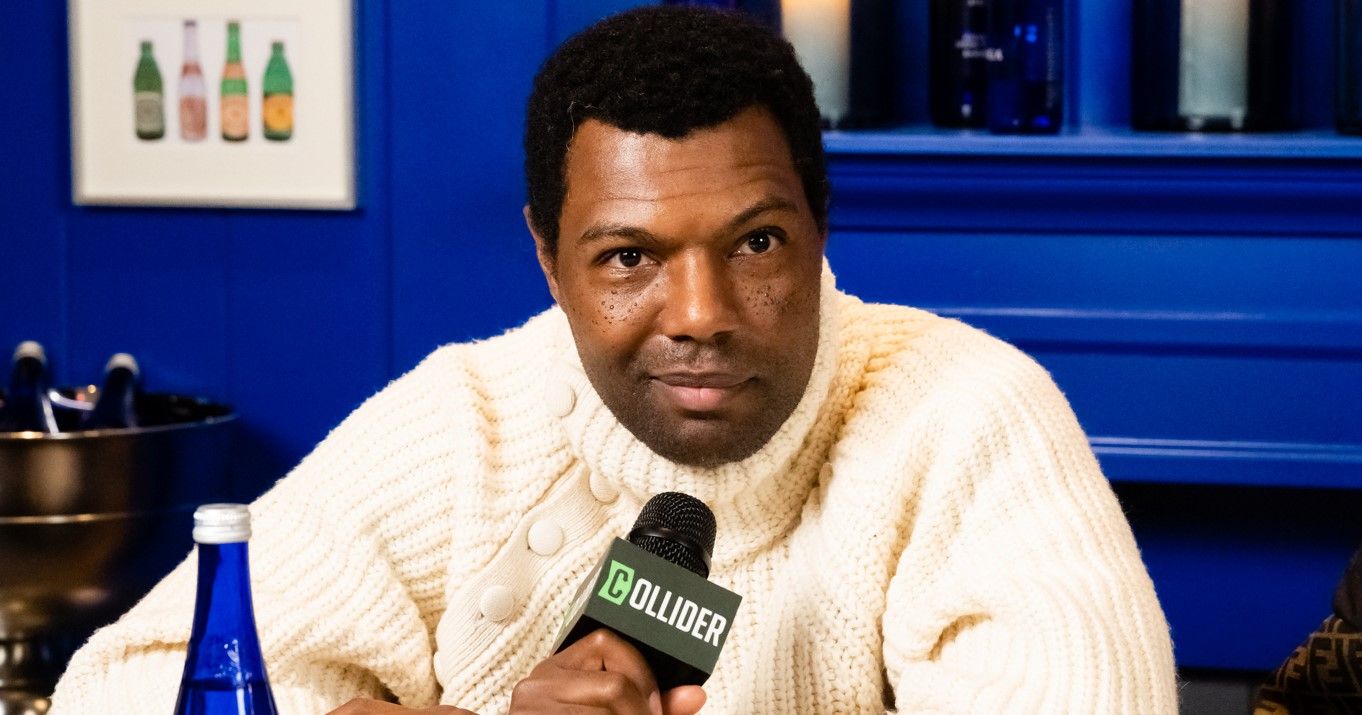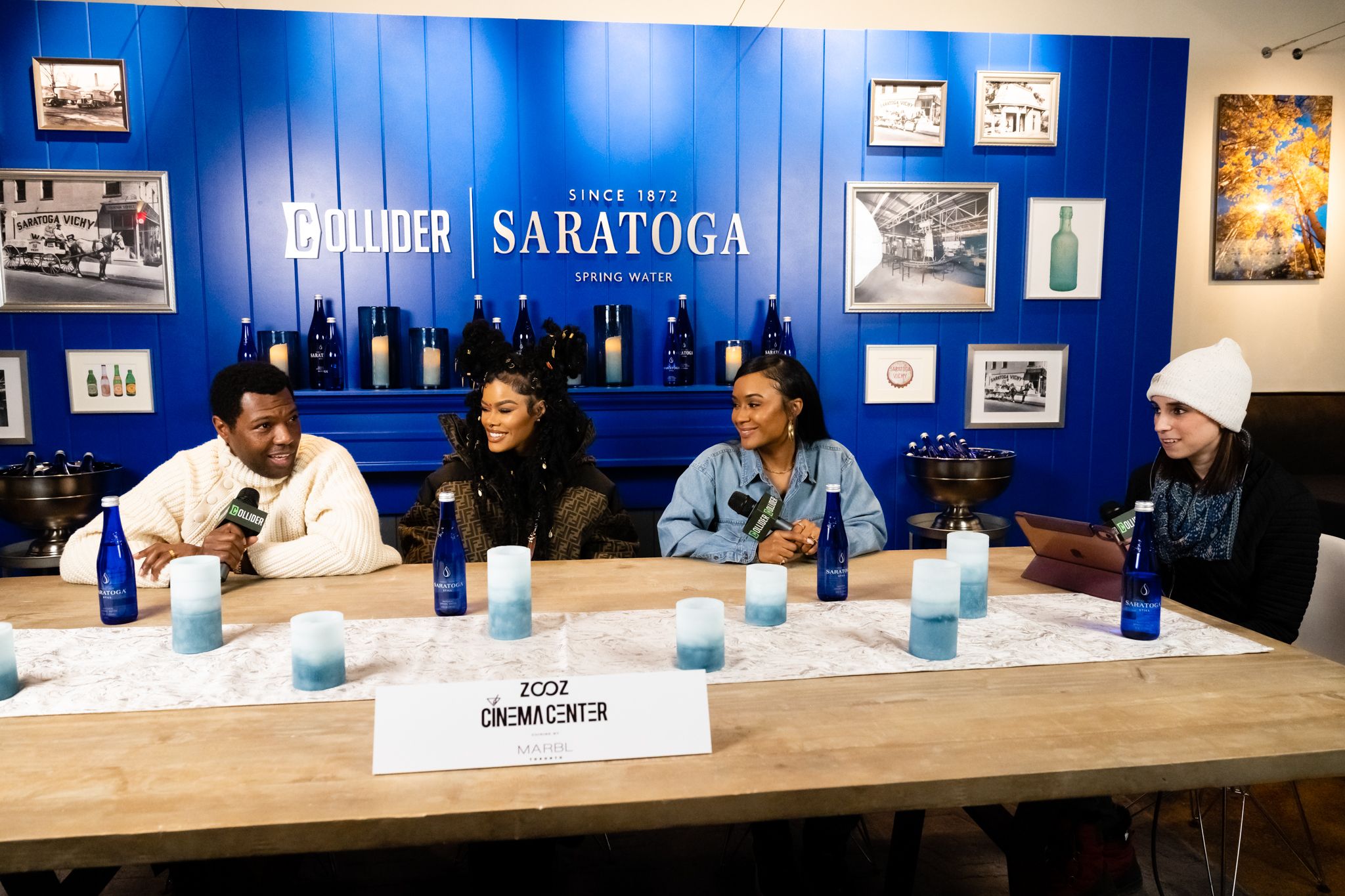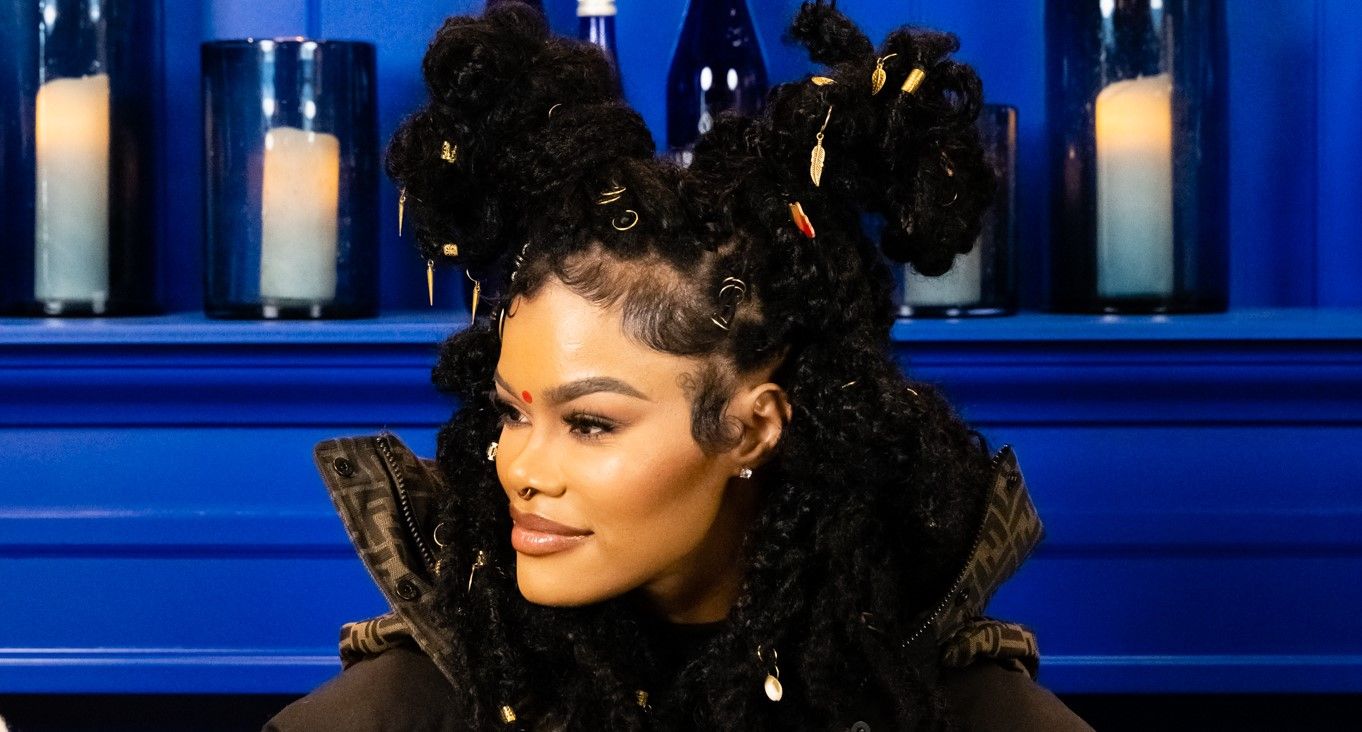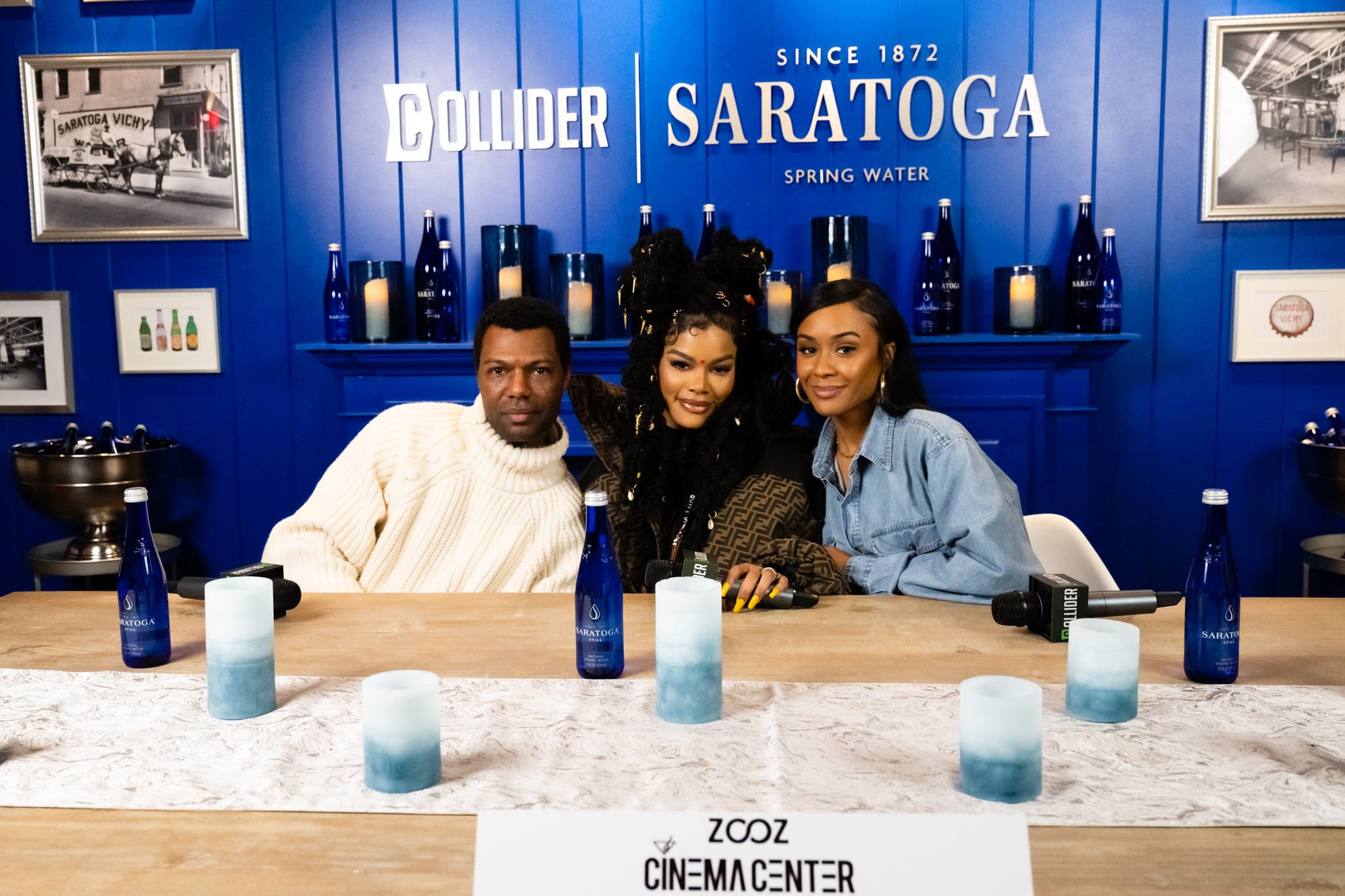It’s tough enough to deliver a stellar film when you've had loads of experience. Seeing someone kick off a directing career with an exceptional first feature always blows my mind, and that’s exactly what A.V. Rockwell does with her Sundance 2023 award-winning film, A Thousand and One.
Teyana Taylor delivers a powerhouse performance as Inez, a woman who makes the impulsive decision to kidnap six-year-old Terry (Aaron Kingsley Adetola) out of the foster care system. The film follows their evolving relationship as Inez does everything in her power to build a safe and stable home for him in New York City in the 90s and early 2000s.
While in Park City for the film’s big debut as part of Sundance’s US Dramatic Competition line-up, Rockwell, Taylor, and co-star Will Catlett visited the Collider Studio presented by Saratoga Spring Water to discuss their experience making the Grand Jury Prize-winning film. During our conversation, Taylor and Catlett sang Rockwell’s praises as a leader on set, Catlett recalled the time when he doubted his ability to bring his character to screen, Taylor talked about the benefit of having fear and nerves when tackling every single scene of the film, and so much more.
You can hear about it all straight from Rockwell, Taylor, and Catlett in the video at the top of this article, or you can read the interview transcript below.
Making a first feature is a very big deal. What did you think was the first step to making that a reality and now, having gone through it, is that a first step you would recommend to other aspiring filmmakers or did you find something that was more effective along the way?
A.V. ROCKWELL: You got to have the idea that you're really passionate about and I think that's very simple, but it's also really critical because you have to climb so many mountains in order to get to where we are today, and you have to believe in it through and through during every moment that you're questioning life in general. [Laughs] Like, how do I get this movie done and made and out the door to share with audiences? You really have to believe in it because it's gonna ask everything of you and so you have to be in it 100%.
To add to that, no matter how much you plan, no matter how many resources you have, there are ups and downs. Can you each pinpoint a low point in the making of this film when you thought, ‘Maybe I won’t be able to pull this off,’ and also where you found the confidence to overcome that challenge?
TAYLOR: A.V. gives the best hugs. Honestly, she really does and she kept us protected. I went during my lunch break, three different lunch breaks, I'd been to three different funerals in weeks, so I was dealing with a lot of death, losing friends in Harlem and it was just like, to come back to set, ‘Okay, how am I gonna pull this together and get it?’ And it's just like she would see. I wouldn’t even have to tell her what was going on, and she’d give me a hug and I’d cry, and then we get to it. She made me use whatever it is, and it's in my heart what I'm feeling, and she’d make me put it into the scene, so I was able to channel all my energy through Inez.
We seriously can't undervalue the impact of a good hug.
TAYLOR: It doesn't matter what it’s about. Whatever it is you're going through, whether it's my business or not, you know what I'm saying? This is what we're going to do. That goes a long way. Nothing has to be said, not a word.
ROCKWELL: Because sometimes, or a lot of times, words just aren't enough.
WILL CATLETT: [A.V.] emailed me and is like, ‘Can we talk?’ And we went to a restaurant and I simply said, ‘I don't know if I'm the guy you want.’ And she's like, ‘No, you are the guy I want. That's why you’re here and I just want to tweak some things.’ And then, on top of that, I'm coming to New York — I'm from DC. I'm not originally from New York. And it's like, ‘Oh, you need this accent.’ So I'm like, ‘Ah, shit. Accent, A.V. wants to talk. Okay.’ So that was going to be a low moment for me, but then I hired a dialect coach, and then when me and A.V. sat down and got a chance to talk, I understood her rhythm and what she was trying to do. So there's some things that I wanted to do that I had to surrender to her vision and what she wanted to do. So it was a beautiful moment that became a high because when we fast forward to a scene that we do, an intimate scene that we're doing, at this point, we're talking without words. I'm looking at her, I said, ‘Let me try something,’ and it was something in the scene that was needed that was not there and had we not had those moments then that trust wouldn't have been there in that moment. So I needed that low moment for the other moment to happen.
That’s why I ask that! Low moments aren't bad. They’re just something to build on and make something else better.
CATLETT: Yeah. But when you get that call from your director or an email, ‘We need to sit down,’ I'm like, ‘Oh, damn!’ [Laughs]
ROCKWELL: Also the fact that he thought he had a New York accent already.
TAYLOR: Are you serious?
ROCKWELL: You didn't think that you had a DC accent. There's a difference!
CATLETT: No, no, no! I didn't even think about it until we were shooting the scene. But she was like, ‘Nah, say it like this. Say it like this.’ I said, ‘Oh, shucks. Okay, let me call a dialect coach. Let me call my boy Amin.’ He’s from Harlem. Let me get that Harlem bounce, baby! We came back to set, I was on! [Laughs]
ROCKWELL: You was, you was. I’ll give you that.
A.V., I'm not letting you get out of that question. I want to low point in this production.
ROCKWELl: Fair enough. I was actually incredibly burned out after we wrapped principal photography, and I had never experienced that. You have little moments, but I was just really like, wow. And so I think actually something that really meant something to me, kind of similar to what you said about hugs, is a young lady that was a part of our crew, she sent me this really wonderful, thoughtful care package. She came out of the foster system, so she had no idea what the story was before she joined our crew, and I think just in the process of making it and going on this ride with us, she was like, ‘I feel like you told my story,’ and that meant so much to her because she felt so seen. So I had a moment where I was kind of like, ‘Do I want to finish this? Do I want to make movies?’ I just didn't physically have it, you know? Mentally have it. I remembered why it was so important to get this story and to get stories like this out there because people just want to feel seen. They want to feel understood. They want to feel like other human beings are watching their stories being told who’ll empathize [with] them, like they empathize with our characters. So that was just a really visceral reminder for me for why I make movies in the first place.
I do want to go back to the casting process, but your answer is reminding me of something I like to ask often. I’m a big believer that in this industry we don't tell people good job nearly enough, so was there ever a time on this set when someone behind the scenes really crushed their work and you want to tell them, good job, I appreciate your hard work?
ROCKWELL: I think everybody. I feel like it was a production that was so hard to get through, shooting in COVID, shooting a movie with a small budget, shooting during severe weather, etc., etc, etc. And so I think our crew, I’m immensely grateful to them in general.
I think one shout out that I can think of in particular is the art team because it was really important to me to feel like this was an authentic home for this type of woman in the 90s and early 2000s, and that's a period that's actually not well documented in terms of, what did Black people live like? And so I felt like I could describe it over and over, the nuances of what I remember, but I didn't have a lot of picture references. It was actually when we were location scouting with my production designer and I was like, ‘There it goes!’ Just certain people in their homes [that] still had the bedroom sets or certain types of leather couches or whatever, and so we got our iPhones out and we got all those documents because it's a lived in, breathed in experience of what I felt like I needed to see when I thought of anybody — like all the mommies and aunties that would have been living like Inez. You know, the plastic on the lamp, when you thought you were living large with certain furniture sets that aren't really around now. It was really important to get that. And the art team, I was really proud of the work that they did to get all of those details right.
TAYLOR: Honestly, all of the props, scouting. Everybody was really sweet to me. And, like she said, the whole team really, really crushed it and it takes a village. It really do. And us being in front of the lens is a very, very small part of a movie.
Maybe small in a sense, but very important!
TAYLOR: No, very important, but what I’m saying is if it’s not for the village, we wouldn’t have a town.
For sure! Hundreds if not thousands of people are responsible for making a movie.
TAYLOR: Exactly.
ROCKWELL: I think what she's tapping into is that even though their part is incredibly critical, that a movie is the sum of all parts and no one part is above the whole coming together.
Time to backtrack. I had read somewhere that originally you didn't think Teyana was the obvious choice for this role, so it was making me curious, what did she do in her audition that changed that made you say, ‘Yes, I have my Inez now?’
ROCKWELL: Within a short audition tape I got to see the breadth of what I was looking for in terms of not only what was critical in terms of performance, like just the actor being able to really give something honest to the scene, but also the authenticity that I was looking for and feeling like I could see through her performance that she knows this human being in real life or she is this human being in real life in the ways that I needed an actress to really connect to the material, because I think you don't see a lot of that in Hollywood. I didn't want it to feel like it was performative. Like, 'Oh, let me be this urban woman, this ghetto woman,’ or whatever. You know what I’m saying? I needed somebody who’s just like, that's my auntie or that was me at a particular age, and I think Teyana had that in her innately. And I felt like, similar to me, she has a lot of New York that she oozes out naturally. And then she just had the chops to be able to deliver those really difficult highs and lows of the movie, like the joy and the pain with such range and that levity and that grit that Inez has.
There is a significant amount of range to your character and we also cover an extensive amount of her life. Of everything she goes through, was there any particular thing you were most intimidated to play?
TAYLOR: Life whooped Inez’s ass so there was never a moment that did not intimidate me. But I feel like I needed to feel that, you know what I'm saying? I don't want anything to be easy. I don't want anything to fall in my lap. So it was like I could bitch, moan and holler about something but I'm gonna get the job done. And I needed that fear. And fear is okay. Nothing is wrong with fear because it puts you in survival mode, and as Inez, I had to survive. So if I didn't have that fear, I wouldn't step into survival mode.
I always feel like if you don't have fear and you don't have nerves, it's probably a sign that you don't care, and you can't not care in filmmaking.
TAYLOR: Exactly. Because there's no passion in things being easy. There’s no passion in feeling like you know it all, you got it all down. It's like, where's the passion in that? You got to fight for something and I'm all about the fight. If you have no fight, we could just never be on the same page.
Will, I'm coming your way. Inez and Terry are the main characters of the movie, but you are pivotal to their journeys and then on top of that, you also have to make Lucky feel like a whole person even though we don't get the same amount of private moments with him. Are there any backstory details that you came up with that we might not hear about via dialogue or see on screen, but we can feel informing your performance and making him whole?
CATLETT: I think it was just him being present. When I watched the film some of the looks he would give Terry, the looks he would give Inez, the looks when he was on the couch, the basketball scene, all those moments gave you his backstory. I think if there was more, then it would have taken away from what was right there in front of you. Lucky was a joy to play. I have an amazing father in my life so a lot of things I was able to put into Lucky — but that was already written. Like, walk on this side of me. My dad had told me that when I was a young man; you walk on this side of the street. So those things came so natural. Hats off to A.V.. It was all on the page. Sometimes when you do a lot of projects, it's not on the page, and great actors look for things that are not on the page, but when it's there, then that's the gift because you can just live with what's there.
I have so many collaboration questions. Will and Teyana, I’ll go to you two first. What is something about A.V. as an actor's director that made all the difference for you on this set that you hope to experience with more directors in the future?
TALOR: Feeling protected. I've been saying that all day. We're very, very big on that because a lot of people, they step behind that camera and they want what they want and then that's that. But she's not going to say we got it until everything is perfect, you know? So it was like sometimes you'll be like, ‘Oh my god, this was the take,’ and then you see the movie and it’s like, ‘Wait, what happened?' But it's just like, she knows when she got it and she's not gonna have nobody looking crazy. So it was like a trust that you have, it’s a vulnerability that you can have with a person that makes you feel safe [with] so many different levels of protection, mental protection, emotional protection, spiritual protection. She's given us protection all across the board, and that’s a big thing for me because I've been on a lot of sets where I have not felt protected.
CATLETT: For me, you may see a five-foot-something human being, but that's a giant right there, and she’s not going to back down on what she wants, and that authenticity reads through. So when you have someone showing up in their life as authentic as she is, it forces you to be authentic. She's not trying. She's not trying to prove anything. Even doing this, she’s not trying to prove anything. This is what I thought, this is what I wanted to share, here it is. And there’s so much freedom in that, and it allows you to be free and I thank you for that.
I love asking this question and hadn't in a while, but now I'm curious, what is A.V.’s monitor dance? What does she do behind the camera that signals to you, ‘I like this take. We’re good to move on?’
TAYLOR: I know one! I love when she brings that little paper. She's got these little sides and it will have all the doodling and all these different notes and I'm like, 'Are you saving all of these?’ But it's like, once again, it's that passion, you know I'm saying? She does do this little smile because she don’t really like to smile much, but I know she’s happy. She do this little look and I’ll be like, ‘Yeah, I killed that shit.’ You just know she happy, but that's what I love because she's readable. You know. You know when it's like, ‘Okay well, T, we just gonna try that one again. Just maybe try it this way.’ So it's this little smirk/smile thing that she does when she's happy and she got her shot.
ROCKWELL: I’m happy all the time for the record. [Laughs]
TAYLOR: No, she happy all the time …
I’ve seen a lot of smiles today!
TAYLOR: But me, I’ve got a little bit of resting B face, you know? People won’t know that I'm super sweet and silly until I'm like, ‘Hey!’ She has a great balance and it's also part of being a professional, you know what I'm saying? I'm not gonna feel like I'm doing what I got to do if she happy-go-lucky all the time. It's time to get down to business because she’ll smile and be like, ‘Alright, now back to work.' I love that. She balances making you feel comfortable. She balanced professionalism and being family oriented. She balanced it very well. So that's what I mean. I'm not saying she's an unhappy person.
CATLETT: I would say A.V.’s like Coach K. She’ll come over to me and it'd be good and she’d be like, ‘Yeah, I want you to lean more into that tomorrow.’ So I’m like, ‘Okay, okay. I got it.’ So she likes something, but we need to carry that over to the next scene. As a former basketball player, I like that. It’s stoic with her. She ain't gonna let you know too much but she’ll let you know …
TAYLOR: Exactly! That’s what I’m saying! She got this swag. She’s just real swag.
CATLETT: And she be fly on set, too. She's like the flyest director I’ve seen.
I’d believe it! They're singing your praises. You’ve clearly got this work down, but we learn something new on every single production, so what is a new tool in your directing toolkit, so to speak, that you know you can credit to A Thousand and One that you're excited to apply to a future film?
ROCKWELL: I think I learned to be present in a new way and on another level, and I'm extremely grateful for that. And I think anybody who [does] spiritual meditation, that type of stuff, I feel like, oh, it clicked for me on another level because I had to show up in a way that wasn't asked of me on prior productions. And so I'm super grateful for that, and just really existing in the moment and what do we need right now despite whatever level of drama, chaos or uncertainty, and so I'm grateful for that. And I think that with everything that I did have to overcome in making my first feature and all the things that I learned from it, I think it made me that much more of a stronger filmmaker and a stronger leader, and that's really important. Directing is not just getting what you want or what you need, but you have to be the one that is guiding everyone and energizing everyone, and so I think it sharpened my tools in that respect.
Special thanks to our 2023 partners at Sundance including presenting partner Saratoga Spring Water and supporting partners Marbl Toronto, EMFACE, Sommsation, Hendrick’s Gin, Stella Artois, mou, and the all-electric vehicle, Fisker Ocean.

